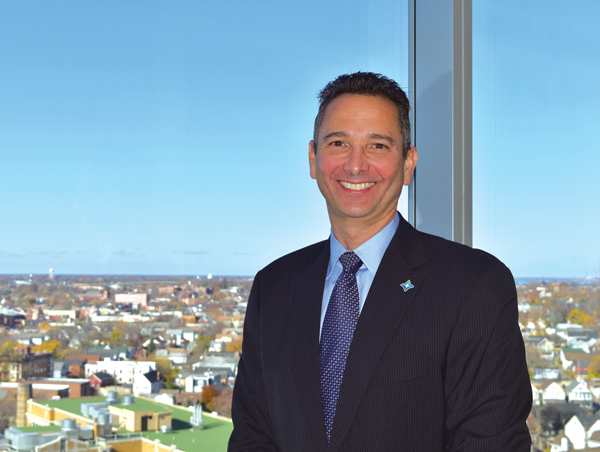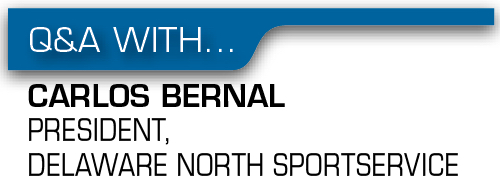Carlos Bernal returned to his former employer 30 years after first working for Sportservice as general manager of old Chicago Stadium and old Busch Stadium. Bernal left Sportservice in 1991, and since that time he has worked for HMS Host, The Mills Corp. and Rice Garden, among other stops. He was most recently North American CEO for Wagamama, a chain of Japanese-themed restaurants. In August 2015, he returned to Sportservice as COO and served as the firm’s interim president before taking over the job permanently. Bernal discussed his goals for the company and current trends in the sports food industry with staff writer Don Muret.
How did you end up back at Sportservice?
BERNAL: [Delaware North Chief Operating Officer] Rick Abramson and I have stayed in touch over the years. He’s been a good mentor. He reached out a couple of years ago to see if there was a level of interest for me rejoining the company. There were exciting things going on here. It led to some conversations, and subsequently, a few interviews later, I came back. For me, it’s a perfect homecoming and a responsibility I don’t take lightly. We’ve got really talented people in our company and I want to be there to help our future leaders. People gave me that opportunity when I was a young guy years ago. So, to be in that place now, to be able to move that forward for folks in our company, is pretty cool.
How have things changed in sports concessions over the past 30 years?
BERNAL: The thing that hasn’t changed is it really is a relationship business. It always was before I left. One of the single most important things is being [a team’s] partner in what they want to accomplish. … What has changed a little bit is, we’ve always had analytics and data over the past 30 years, but we probably drove more back internally how we ran our business. Today, it’s about pulling together the information [teams are] looking at in terms of their fan base, connecting the dots in terms of what we’re doing and bringing it together to look at it holistically, so we are smartly looking at our business and moving it together jointly.
What does it take to meet the needs of the younger generation attending games that may not be interested in
 |
| Delaware North Sportservice |
the event itself?
BERNAL: They’re really looking for an experience within their peer group, whether it’s more of a destination, where you still have the [game] view and connectivity through mobile devices and TV monitors, but more relaxed and laid back. It’s not necessarily sports driven, but environmentally driven. It’s comfortable, it feels right and you’ve got the best product available, because they’re foodies too. They’re in tune to what’s happening with food, and craft cocktails and beers. For us as a foodservice company, it’s to provide those things for them that they’re used to doing outside of the stadium and arena. We’ve always had our favorite spot to watch part of the game if you don’t want to stay in your seat. Today, it may not be a club, but an outdoor area where they’re all meeting and mingling and doing all those things.
For Sportservice, where do you see growth?
BERNAL: It’s about organic growth. How can we, with our clients, grow market share within the four walls of a stadium or arena. And that’s doing some of the things we were just talking about. Call it millennials, whoever it is, how do we collectively pull the data and information together to increase our capture rates within stadiums and arenas that we have. That’s a big focus.
What other trends do you see out there?
BERNAL: From a technology perspective, you look at how people transact business today [with] mobile payment options. Those things are out there today, but how do we really exploit that, from the food side, the team side and ticketing, to facilitate a better payment process. By doing that, can we improve speed of service and interaction so it becomes more of an experience with our associates and the food they’re serving, and take the friction point with payment out of the equation.





